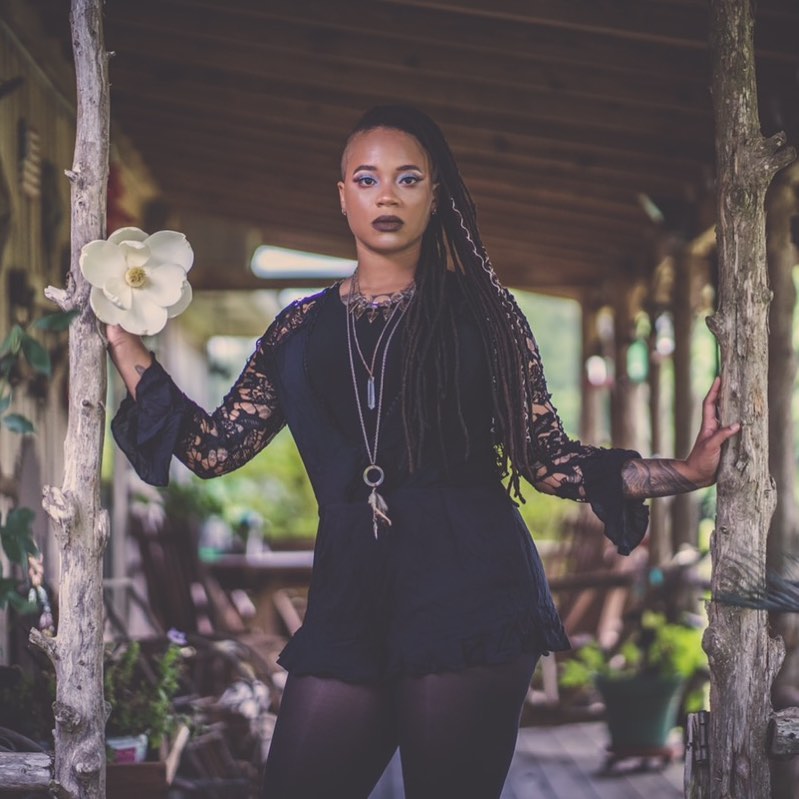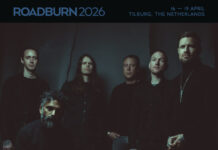After the release of “The Banished Heart,” OCEANS OF SLUMBER tackled a drastic change in lineup. With fresh members, the band worked and came up with their upcoming self-titled album, out through Century Media Records on 4 September 2020. We had the opportunity to chat with vocalist Cammie Gilbert about the upcoming release of “Oceans of Slumber.” Read the complete interview below.

Thank you so much for taking the time to do this interview, Cammie. How are you doing?
Good, I’ve been doing pretty good.
Obviously, we’re here to talk about your upcoming self-titled album. How are you feeling about the release?
So far so good. The singles have given us such an initial excitement for it. It’s gone really well so, we’re feeling relatively confident.
The album is called “Oceans of Slumber,” so the name of your band. I was wondering why you made that specific choice? To me, it feels that it’s somewhat of a new beginning, a new chapter for you. Is that at all correct?
Yeah, absolutely. It’s definitely marking a new beginning for us and kind of a confident stride forward with our sound. I think that that [title] captured it the best after such a transition with the band. It’s not a new sound, but we definitely have a more cohesive, confident sound, so we wanted to put our name on it that way.
Yeah, definitely. I think your sound has pretty much stayed the same, but it does feel really different than, say, compared to “The Banished Heart.” What are the main contributing factors to these so-called differences?
With “The Banished Heart,” there was a lot more singular focus of emotions and all that, it’s just a big experience. One thing that we do with the band is we don’t really try to hold ourselves within any boundaries of how the album is going to sound. For “The Banished Heart,” we had a lot of dramatic and negative experiences to get out and kind of digest, so that’s what ultimately ended up becoming the album. Whereas with the new album, there’s more excitement and hope for the future that was captured, while still heavy and dark, these moments of ominous and deep emotions, this one just has a lit of bit more flickering light in it.
What I read in the biography as well, is that you open up about mental health and depression. Is it difficult for you to give so much of yourself away in the music?
I think that the healthiest portion of it is writing the songs and getting it out. I think later when I have to perform them and I sort of maybe moved on or feel resolution with that, I don’t always want to revisit what it brings up, but it’s kind of, not that I don’t have a choice, but I’m kind of compelled to let these things out in the music, I feel fine with portraying them that way or being vulnerable that way, it’s not so hard, I feel like it’s a lot better than the alternative, if I were to stuff it down inside. I think it’s for the best that they come out constructively.
So music for you is also like a method of therapy or something like that?
Absolutely, I think without it, I would be in a lot worse shape.

I also think that a big part of the sound is created by your voice. Musicians always say that the voice is an instrument as well, but in your case, it really is true. You have this very versatile style, you can convey a lot of emotions with it as well. Are there a lot of styles in this album that you experimented with?
I definitely experimented vocally. I wanted to utilize a full range of expression that I can get, there’s a lot of different artists that I like. There’s an artist called Mark Lanegan. He has this really low, husky voice and he kind of drives it on the bottom of a song, while at the same time provides such a clean melody and I really wanted to capture that same kind of essence with my voice in the album, as well as the bombastic belts that have become common, I love. I love singing at full gear and as loudly as I can and then I wanted everyone to contribute growls, so I got everybody in the band contributing growls on this, so we definitely wanted to experiment and do some different things vocally.
I also read that you were inspired by a lot of different vocalists that come from a variety of genres, for instance Nick Cave. Are there more artists that don’t do metal, for instance, that you look up to and that have inspired you in some way for this album?
Yeah, absolutely, there’s Agnes Obel, she’s not particularly metal. There is an artist called Sevdaliza, she is a really ominous, dark quality to her songs. She can get a bit pop, but she has really nice darker songs. Mark Lanegan again, he’s blues/folk rock, I’d say. Another artist called FKA Twigs, I like how she uses her voice, she’s very versatile as well, she can sound very operatic at times. A lot of country artists, I listened to a lot of country this past summer and over the last year, I’ve been into a lot of country. Obviously classic older artists Billy Holiday, Nina Simone, they’re absolutely huge influences and they’re not metal.
Yeah, that’s somewhat surprising to me, but I have a feeling that country music is a lot bigger in the US than in Europe. So, it kind of makes sense I guess.
I think country music in here is like metal music is over there. While someone may not listen to metal, everybody probably knows some metal songs. Over here, while you aren’t necessarily, “Oh, I listen to a bunch of country music,” you still know a few country songs (laughs). They play it everywhere when you grow up and in schools, at least in Texas, you have rodeo and then we have, we call them, it’s like where you do-si-do, you have little country dances at the school and they play country music, from elementary school and up. And so you get indoctrinated with a bunch of country music, but we… it’s like Merle Haggard, really old artists. It’s such wonderful storytelling in their writing and a lot of it can be very dark, it’s usually pretty soulful, the story tempo, more doom-esque songs, versus what comes to mind [sings upbeat country tune] but maybe it’s not that bad. When I refer to country, it’s not implying the get-up and get-‘im songs (laughs).
That’s actually interesting, are there any other Texan things that inspire you?
I mean, nature is a huge influence, we go out to the country all the time – my father’s family – and it’s farm country out there. We spend a lot of time canning and pickling stuff and we have the old radio station on out there. It’s that ’80s/’90s country as well as older stuff. It’s just an era of transition that comes from the nation, as well as a new approach to sound and songwriting that I feel like isn’t captured anywhere else, so it’s there and I like that I’m leaning more into being a better storyteller with my lyrics. At times, they can be kind of ambiguous or lucid and so I like the idea of telling a concrete story nearly from finish to end that I feel like you don’t find in too many songs outside of country.

Yeah, your writing style is also very poetic. How do you usually go about writing the lyrics? Does it stem from an idea you have or is it more like a creative flow?
So, I’ll get the song when it’s pretty much finished. I sit with it… so Dobber would give me a theme or an idea based on what inspired him for the music, I’ll know that, and then he’ll kind of tell me whether he wants to stick to that or if I can do whatever I want with it. Sometimes, the inspiration for the song is not the same as the inspiration for the lyrics, which I think is kind of neat sometimes. I take either his suggestions or I have free reign and whatever comes to mind as a movie in my head, I think of images first, so I kinda just space out with the song and whatever story comes to mind, then I go from there, or if it sticks to a particular emotion within me about a certain experience I had or something, kind of like whatever feeling, whatever emotion resonates the loudest, listening to that song then I kinda follow it down that rabbit hole. A few songs, I’ll have writing that I have already done and they make me think of that, so I’ll go and find that writing and see if I can get it to fit lyrics for the songs. I have a lot of different modes that I can pull from to write and try and maintain the overall theme of whatever it is that we’re going for with the album.
What was the writing process like for the album? Was it the same as usual or did you guys do something else?
It was a little bit different just because a lot of the album was written in the transition of the other guys leaving and finding our new band members. Dobber can’t stop writing, so he had been working on songs and stuff, knowing that we weren’t going to let the band dwindle out. We were gonna keep moving forward. So while we were looking for new members, as they came in, they helped finish and perfect songs. So was first it was Jesse and then it was Semir and then it was Xen and then Matt Bowsier, he’s helping too. It rolled in kind of separately and then when everyone was in the band the album was done. But it went really fast, it was kind of a cool process because as the songs came to life, so did the new band, so it was really cool.
The process that you created and the new flow with the new members, is that something you want to explore more in the future?
No, absolutely, I think that they are really good writers and I think that the next go-around… it’s a similar way that we work and I think it works best but I think with then having had all this downtime with the coronavirus and stuff that we all have been writing quite a bit and have things, so I think the next album (laughs) will be done before I am even ready. It’s going to come together pretty quickly.
Today you also released a single, but I’d like to talk about your previous single “The Adorned Fathomless Creation.” What I found interesting in the song is the way it starts, with the backward vocals. Why did you make that creative choice?
It’s an ode to a band that Dobber really liked, a death metal band, and my mind just went and played with it. It’s a tribute to that, it’s the backward part from the snare kit and that’s kind of a tribute to this band.
Some hours ago, you released “Colors of Grace.” The video also featured Mick Moss from ANTIMATTER. Can you talk a bit about the collaboration?
Yeah, we’ve been big fans of ANTIMATTER for a long time and we loved his voice and had been… we liked to kind of do a clean male-singing duet on the album, and so we have just been good friends and we asked him if he would collaborate. That song, I wrote with him in mind, and so that gave me a better preparation for it, but we wrote that with him in mind, so I wanted to make a song that was in a style that I felt like he would like, that he would want to collaborate on, so he was happy to do that and I think it turned out really great. It’s one of my favorite songs from the album.
The songs are, especially the singles, very diverse. Why did you pick those specific songs to become a single? Was it the label’s choice?
They were our choices, and the label obviously gets their input too, but we wanted to kind of showcase a full array of what people can expect from the heavy and raw to the more ballad and sincere. We’re putting out singles, people are gonna think that’s what the whole album is gonna sound like, so with us being such an eclectic band, it was important to show the different ranges that could be expected.
The pandemic situation has complicated things for many bands, yet you were lucky enough to shoot some videos. When were these videos shot and do you have any stories connected to them?
They were shot at the very beginning of the shutdown. We utilized what we could before any major shutdowns happened. Then with this one that actually just came out – I know that it’s gotten mixed reviews about it – we shot that now. It pretty much got finished earlier this week and then was put out. Mick shot it as his home overseas with the resources that he had and we put it together with what we had shot here, so it was rather complicated because a lot of things were shut down and a lot of videographers and equipment and all that kind of stuff were not available. It’s this double-edged sword of having to put videos out because everybody is so visual and to boost putting a single out, instead of putting just a single out by itself. It’s hard to please everybody. If you want a video, here’s a video and then they complain about it. It is what it is but we were working under a lot of restrictions.
The pandemic causes a lot of issues like this. A lot of bands also had to delay their album release date. It made me wonder about the track named “September,” is that at all a reason why you’re releasing it in the month? Were you also expected to postpone it, since it’s a bit tricky to promote an album without touring?
No, I didn’t realize that (laughs), no Dobber names the songs before we find out their release date. The label decides it. It’s that time of a year and it’s reflective. We wanted it to go with the “I mourn these yellow leaves” and to set the tone for kind of moving into autumn. Even “Colors of Grace” touches on… it’s like where I say “the season aches to change, but it hasn’t yet” it’s when I feel like in Texas, summer holds on really strong and you’ll feel this cold breeze come through and you’re like come on, fall, I know the weather wants to change and it’s still that hot humidity, and you’re like please release us, summer, so it’s about that transition from summer to fall and the reflectiveness that comes with the cooler months on the mind and body. It’s a unique challenge to not be touring.
Another thing with the videos is why we… not forced them to come out, why we really worked hard to get them out and not postpone – we didn’t want to postpone the album, we didn’t want to postpone the singles – so we really worked hard to get the videos finished and keep it on that timeline regardless of the world crashing down, but it’s a different challenge to release them. Everything has just become digital, it already was very heavily digital, but now it’s inescapable. It’s the only way people are learning about you and getting access to you and finding out about your music. That was already there and that’s how it’s already been for a while, but it’s just cut out the other part where you have that live engagement, where you make those connections, see people face-to-face. So it isn’t new, you’re just missing the other part. It weighs heavier on the band and the members versus the label or the album itself. All those parts online were already gonna come out that way, so I think it most heavily undercuts the band because you know we’re not out there reaping the benefit of the work. We make it, then we release it online. I think the true satisfaction comes from performing it and being live musicians, so that’s just what’s been the most frustrating about the whole thing.
It’s interesting when you mentioned about autumn. Earlier today I was wondering if I would compare this album to a season, especially because you released the “Winter” EP, I was myself thinking this is an album that fits autumn very well. There’s this kind of mood and such, anyway, I just wanted to say that.
Yeah, I like that (laughs) if in the future of our discography, we could have an album that felt right for each season in the end, then that would make me happy.
Yeah (laughs) well I’ll let you know in the future.
Awesome.
You mentioned you want to perform this live. A lot of bands are doing live streams and other initiatives, What do you think about these and is this something you’re also interested in doing as a band?
I appreciate other bands doing that and I watched several. I’m not a big fan of cell phone videos or going live, I feel like you’re at the whim of your internet connection and then the quality of the video is only going to be so good. I think for Q&A and certain things it’s fine, but I’m wary about using it for the full band live session because we’re trying to capture pretty complex sounds through our speaker or through a microphone that wasn’t equipped to do that. Obviously the quality of the music is very important to us. We do plan to do a virtual live show with a Q&A and such, we’re just trying to figure out the format that’s going to work work the best to make sure that… you know, it’s the first time that people are seeing us do it live. We don’t want it to be a crappy cell phone recording. So we’re trying to figure out the best route for doing that and then incorporating those live elements, where people are getting to talk with us real-time.
Okay, cool. You’re also a guest vocalist on AYREON’s new album “Transitus.” I wanted to ask you briefly about your experience taking part in that project and if there’s something you learned there that you might use for OCEANS OF SLUMBER?
It was super awesome working with Arjen. He’s a brilliant music mind. Watching how these albums come together in his head is extraordinary. I feel like I get daunted by making a song that’s trying to tell a story and he’s comes up with an entire album (laughs) with multiple artists at different times. It’s incredible. He had heard “The Banished Heart” and liked my voice a whole lot and wanted me to be on the new album, so I was super blown away and super gracious for this opportunity. He definitely knows what he wants and when he hears your voice and he makes a song to be what your voice is, so he definitely had me push to a realm that I hadn’t felt like I’d found before, and a style and approach that, while new to me, he knew that my voice could do.
I did a lot of vocal instruction because I was super nervous (laughs), working with this amazing artist and I’m going to be this lead girl, I need to get my shit together. You run into different hiccups vocally, so I was like no talking, every day extreme hydration, supplements, anything and everything physically that my voice was in a good shape. Then I took lessons with Mary Zimmer and she helped me maintain a healthy technique – ’cause I have a habit of throwing my voice out due to trying to be too crazy – so she helped me strengthen my technique a lot. I felt super nervous but prepared when I finally went to record it then, so I think what’s translated is [first] my love and appreciation for vocal instruction; I’ve been told that I’ve hadn’t had any, but I think it’s helped tremendously. Then with the new album, just showing that I can play around with it more and I had that safety net of someone to help me figure out how to achieve certain things. I didn’t have to just push through it or figure out on my own, that’s been a really awesome new tool.
Well, both albums sound really, really good, so congratulations. I think you really pushed yourself in both of these albums. Anyway, our time is almost up do you have any last thoughts you want to share with our fans and our readers?
Thank you. I hope everybody is staying safe and healthy. We obviously look forward to trying to get back out there, rather sooner than later, but definitely check out all of our platforms. Me and Dobber we answer everything that’s written personally, so we enjoy all the interaction from everyone.
Interview by Laureline Tilkin





